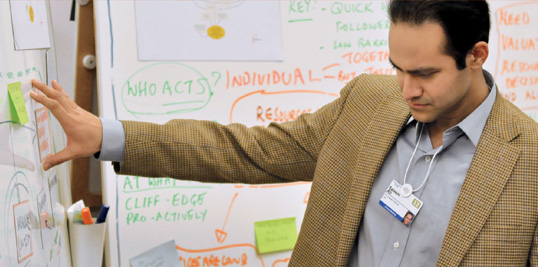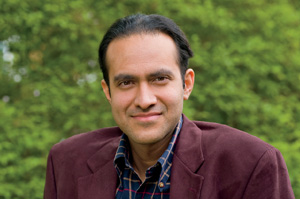
 |
|
alfredo carlo |
|
Saleem H. Ali attended this year's World Economic Forum in Davos, Switzerland as one
of the WEF's 190 Young Global Leaders. "Finding ways by which the environment can help
to develop our economies while also mitigating conflict remains a personal and professional
commitment for me," he says.
|
"Greed is not bad," says Saleem H. Ali.
If this sounds odd coming from a professor of environmental studies who is also the director of the Institute for
Environmental Diplomacy and Security at the University of Vermont (uvm), Ali will
explain that greed is not simple avarice. It's part of our "treasure impulse," which powers not only our
desire to collect and consume but also our quest to innovate and discover "new ways to harness materials and
energy to better the human condition." Today's challenge, he says, is to focus this impulse on planet-wide challenges.
"Pollution is one problem, but so is people dying of hunger and poverty," he says. "If you really
value human existence and quality of life, the quest for innovation should always be there."
In his 2010 book Treasures of the Earth: Need, Greed, and a Sustainable Future, he explored these and
other ideas drawn widely from geology, economics, ecology and psychology. Among them are concepts like "sustainable
consumption," "livelihood chains" and "elemental accounting." This last concept has been
pioneered in the mining industry through such initiatives as the 2003 Kimberly Process that tracks diamonds in order
to prevent the industry from inadvertently financing armed conflicts. It turns governments and companies into partners
in resource tracking, it can improve buyer awareness, and it helps keep "blood diamonds" out of
international markets.
Born in New Bedford, Massachusetts, Ali spent part of his childhood in Pakistan, his parents' homeland, and he credits
the experience with his love of bringing together diverse ideas to produce something new. For example, he says, he learned
to see Pakistan's repair and service industries in the light of sustainability: These countless small and often informal
businesses not only fix what might otherwise be discarded into landfills, but also provide jobs.
This leads to broader notions such as "industrial ecology," where the goal is "to make waste obsolete,
whether it's material or energy. It's based on the premise that industry is a permanent part of the planet, so it should
be thought of as part of the natural system," says Ali.
 |
|
sally mccay / university of vermont |
Such positions often put him at odds with what he calls "the anti-technology narrative" among environmentalists.
"Technology can be misused," he says, "but we must constantly seek new ways to better the human condition."
He cites the Kalundborg Symbiosis in Denmark, where diverse industries "became mutually beneficial by using the by-products
and energy discarded by one as raw material for another." Kalundborg, however, didn't develop by industrial partnerships
alone: Government provided catalysts in the form of high fees for landfills, water and energy, and it's these kinds of
partnerships Ali often advocates, the better to stimulate innovation.
His "brave thinking," as his uvm colleague Thomas Hudspeth calls it, is bringing Ali
global recognition. Last year, the World Economic Forum named him a "young global leader"—he is not yet 40—and
Britain's The Observer Magazine included him among 20 "green giants" who will be "setting the global
environmental agenda in the coming year." Seed magazine in 2007 listed him among eight "revolutionary minds
in the world."
Ali's multidisciplinary approach is essential, says Hudspeth. Prior to his professorship, he adds, Ali "worked for Fortune-500
companies, so he has an insider's perspective on both business and the environment." Hudspeth, like Ali, finds that their field,
environmental studies, increasingly demands that its students become knowledgeable in sciences and engineering in order to understand
environmental complexities.
Peace Parks is the title of a book Ali edited in 2007 that offered analysis of some of the world's 188 parks that
straddle international boundaries, and proposed a step-by-step guide to creating and strengthening them. Peace parks, Ali says,
reduce political conflict through environmental and resource cooperation.
"If you focus on the environment as a quantity rather than quality, you'll fight over it. To ensure its quality, you'll cooperate
over it," he says. This work contributed to his selection as an "emerging explorer" in 2010 by the National Geographic Society.
When the un-mandated University of Peace, founded in Costa Rica in 1980, wanted to develop a curriculum
called Peace Education: Islamic Perspectives, Amr Abdalla, professor and vice rector, came to Ali. "A wide population
of Muslims relies to a great extent on their understanding of their religion to guide all aspects of their lives. We see no
contradiction between Islam and disciplines such as peace, conflict and environment," says Abdalla.
"A high standard for environmental responsibility," he adds, helps people "move away from an attitude focused on
their own specific self-interest to an enlightened understanding of their self-interest within a wider sense of responsibility to
the environment, based on their religious teachings." In Pakistan, the curriculum will be taught as an experiential program,
bringing children from government, private and religious schools to study together; in the us, California-based Zaytuna Academy
will bring the program to Muslim schools.
To Samir Doshi, a former student of Ali's and now a postdoctoral fellow at Queen's University in Canada, Ali is an iconoclast.
"Saleem always questions convention. I have seen [him] play devil's advocate with the effect that a community or stakeholder
arrives at a better understanding of those who disagree with them. This is one aspect that makes him so effective at conflict resolution
and negotiations. It is also a much needed quality in environmental planning and sustainable development."
 |
Naazish YarKhan is a content strategist, writer and editor with a master's in communications.
She has written extensively for media including National Public Radio, The Huffington Post, Chicago Tribune and
Common Ground News Service. |